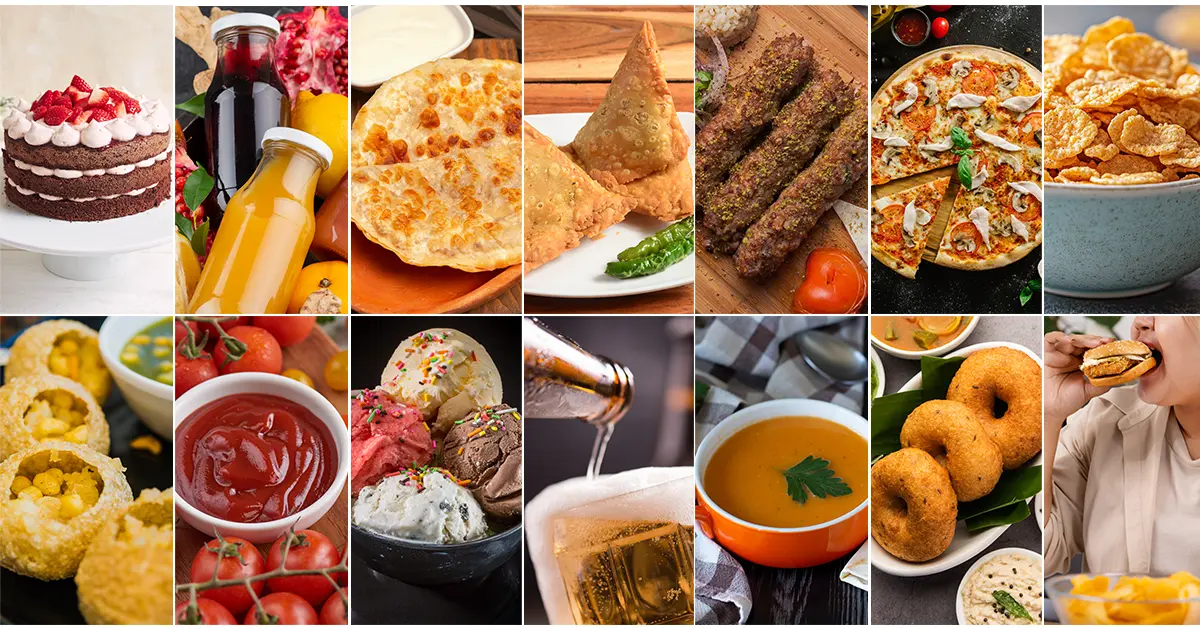14 Essential List of Foods to Avoid in Diabetes

“Can I eat this?”
“Will this affect my sugar levels?”
If you’re managing diabetes, these questions might feel like a constant companion every time you look at your plate. It’s normal to feel overwhelmed when trying to figure out what’s safe and what’s not.
The truth is, diabetes management isn’t about giving up all the foods you love – it’s about knowing what works for your body and what doesn’t. While it can be hard to resist that gulab jamun or your favourite samosa, making smarter choices can go a long way in keeping your blood sugar levels in check. We can help you, too 😀
In this blog, we have listed 14 kinds of food that you should avoid if you have diabetes.
1. Sugary Treats and Sweets
If you’re managing diabetes, you should exclude these foods from your diet as they are among the foods to avoid in diabetes.
- Candy, cookies, cakes, pastries and mithais are at the top of this list.
- They’re packed with sugar and can cause quick spikes in your blood sugar levels.
2. Sugar-Sweetened Beverages
For better blood sugar control, remember these are the following foods to avoid with diabetes:
- Drinks like soda, fruit juices (even homemade unsweetened fruit juices), energy drinks, sharbat, falooda and sweetened iced tea often contain hidden sugars.
- They provide little or no nutrition and can lead to unhealthy blood sugar swings.
To know your chances of Diabetes reversal, take the Diabetes Reversal TestDiabetes Reversal
Calculator
3. Refined Carbohydrates
The following foods should be avoided when you have diabetes: Refined carbohydrates like white bread, white rice, and maida-based items such as bhatura, kulcha, and mathri. These foods can lead to sudden increases in blood sugar levels due to their low fiber content.
4. All Fried Snacks
The snacks, including samosa and batata wada, fall into the category of foods to avoid with diabetes due to their high content of unhealthy fats and carbohydrates, which can cause blood sugar spikes and promote weight gain.
5. Processed Meats
Processed meats like red meats, ready-made kebabs, and nuggets. These items are on the list of foods to avoid with diabetes due to their frequent inclusion of unhealthy fats, potential added sugars, and preservatives.
6. Full-Fat Dairy Products
Among the foods to avoid with diabetes are high-fat dairy products, which encompass whole milk, regular cheese, malai paneer, full-fat curd (malai dahi), ghee, and cream. These items can be rich in saturated fats, potentially elevating the risk of heart disease.
7. High-Sugar Breakfast Cereals
Many breakfast cereals, categorized as foods to avoid in diabetes, such as cornflakes and chocos, often contain high sugar content, even those that appear healthy. To make the right choice, be sure to check labels and opt for cereals with whole grains and low added sugars.
8. Fast Food
Fast food, categorized among foods to avoid with diabetes, frequently incorporates unhealthy fats, excessive salt, and oversized servings, posing difficulties in the management of blood sugar levels. This category encompasses items such as vada pav, samosa pav, and popular street foods like sev puri and pani puri.
9. Sugary Condiments and Sauces
The following foods should be avoided when you have diabetes.
- Condiments like ketchup, pickles, papads, chutneys and some salad dressings can be surprisingly high in added sugars.
- Choose sugar-free or lower-sugar options.
10. Sweetened Yogurts
- Flavoured yoghurts, ice creams, and desserts like shrikhand are often loaded with added sugars, which can cause blood sugar spikes.
- A healthier alternative is plain, low-fat, or non-fat yoghurt. For natural sweetness and added nutrients, you can add fresh fruits or a sprinkle of nuts.
11. Alcohol in Excess
Alcoholic beverages should be avoided entirely in diabetes, as they can cause unstable blood sugar levels. Alcohol interferes with the body’s ability to regulate glucose, leading to sudden spikes or dangerous drops in blood sugar.
Additionally, it can contribute to other health issues like weight gain, liver damage, and complications with diabetes management. For overall health and better blood sugar control, it’s best to eliminate alcohol from your diet.
12. High-Sodium Foods
High-sodium foods, considered as foods to avoid in diabetes, encompass items like packaged soups, salty snacks, and processed meats. These can elevate blood pressure levels, thereby increasing the risk of heart issues.
13. Deep Fried Foods
Fried food items such as fried chicken, medu vada, vada pav, samosa, kachori, poori, sev, fried chivda, chakli, and other deep-fried snacks. These foods are rich in unhealthy fats and can result in blood sugar spikes.
14. Excessive Portions
Regardless of what you’re eating, overeating can contribute to high blood sugar levels. Portion control is key to managing your condition effectively.
Which Foods Cause Diabetes?
No single food directly causes diabetes, but eating too many unhealthy foods along with an unhealthy lifestyle can increase the risk of type 2 diabetes. Foods like white bread, sugary snacks, soft drinks, fried foods, and those high in unhealthy fats can lead to weight gain and insulin resistance, making it harder for the body to control blood sugar levels.
In addition to diet, factors like lack of exercise, high-stress levels, poor sleep, and even family history play a big role. Stress and not getting enough sleep can disrupt your body’s hormones, leading to cravings for unhealthy foods and poor blood sugar control. A sedentary lifestyle further increases the risk.
To reduce the chances of diabetes, eat a healthy diet with whole grains, vegetables, lean proteins, and healthy fats. Stay active, manage stress through relaxation techniques, and make sure to get enough sleep regularly. Small changes in your daily routine can make a big difference!
Reduced HbA1c by HALF in 6 months


6.6%
Happy members
EMI
Guarantee
4.8/5
Diabetes Prime Program
What are the Best Foods for Diabetes?
Certain foods can help manage blood sugar levels and improve overall health for people with diabetes:
1. Vegetables
Non-starchy vegetables like spinach, methi, karela, lauki, and tomatoes are rich in fiber and nutrients, helping regulate blood sugar and improve digestion.
2. Whole Grains and Millets
Whole grains like wheat, brown rice, oats, and millets such as foxtail, kodo, and barnyard millet provide slow-releasing carbs and fiber for steady blood sugar levels.
3. Legumes and Pulses
Lentils (dal), chickpeas (chana), kidney beans (rajma), and black-eyed peas (lobia) are high in protein and fiber, aiding in blood sugar control.
4. Nuts and Seeds
Almonds, walnuts, flaxseeds, chia seeds, and pumpkin seeds offer healthy fats and fiber, helping to stabilize blood sugar and promote heart health.
5. Fruits
Low-glycemic fruits like guava, apples, papaya, oranges, and sweet lime provide natural sweetness, fiber, and essential vitamins without spiking blood sugar.
6. Dairy Products
Low-fat options such as curd, buttermilk, and paneer are excellent sources of protein and calcium, supporting stable blood sugar levels.
7. Fish and Seafood
Fatty fish like salmon, mackerel, and sardines, as well as shellfish, are rich in omega-3s and protein, reducing inflammation and improving insulin sensitivity.
8. Eggs and Poultry
Eggs and lean poultry like skinless chicken are excellent sources of protein, keeping blood sugar levels steady and promoting satiety.
9. Spices and Herbs
Fenugreek, cinnamon, and garlic naturally help lower blood sugar levels and support better digestion.
While foods are vital, diabetes management also depends on other lifestyle factors:
- Portion Control and Meal Timing: Balanced portions and eating at regular intervals help avoid sugar spikes.
- Physical Activity: Regular exercise enhances insulin sensitivity and complements a healthy diet.
- Stress and Sleep: Chronic stress and poor sleep can disrupt blood sugar control. Prioritize relaxation and adequate rest.
- Hydration: Drink plenty of water and consider herbal teas or traditional options like jeera and fennel water.
Remember, managing diabetes is a holistic process – focusing on food is critical, but it works best when combined with these lifestyle changes.
How We At Fitterfly Can Help You?
Reading through this blog, you now know how important it is to avoid certain foods when managing diabetes. But let’s face it – making these changes isn’t always easy. That’s where Fitterfly comes in.
At Fitterfly, we specialize in helping people like you manage diabetes in a way that fits seamlessly into your life. Our Diabetes Care Program doesn’t just tell you what to avoid; it empowers you to make smarter, more informed choices.
With the guidance of your Nutrition Coach, Fitness Coach, and Success Coach, we ensure that every aspect of your health is looked after. Whether it’s creating a meal plan that works for you, introducing simple exercises to keep you active, or staying motivated to stick to your goals, our team is here to guide you every step of the way.
What makes our program stand out is its personalized approach. With tools like the Fitterfly app, you can track your meals, exercise, and blood sugar levels all in one place. It’s like having a complete support team right in your pocket, helping you stay on track every day.
If you’ve been wondering how to take better control of your diabetes while still enjoying life, Fitterfly is here to show you how. Give us a missed call at 08068507599 to learn more or speak to one of our program advisors today.
This blog provides general information for educational and informational purposes only and shouldn't be seen as professional advice.
Frequently Asked Questions
Which foods should people with diabetes avoid?
People with diabetes should avoid foods that cause rapid spikes in blood sugar levels. These include sugary drinks like sugar sweetened carbonated beverages like colas, packaged juices etc, sweets and desserts such as gulab jamun, jalebi, and ladoos, as well as refined carbs like white bread, noodles, and pastries. Processed snacks, fried foods like samosas and pakoras, and high-sodium items such as chips and papads should also be limited as they can negatively impact blood sugar control.
Are there foods that people with diabetes should limit?
Certain foods can make managing diabetes more challenging if consumed in excess or too frequently. These include those high in refined sugars, unhealthy fats, or with a high glycemic index. Examples are sugary beverages, deep-fried snacks, desserts, white rice, and foods made with maida (refined flour), like naan, pastries, or biscuits. Processed meats such as sausages and fried chicken may also contribute to weight gain and insulin resistance if consumed regularly. While these foods are not "worst," it's important to limit their intake and enjoy them occasionally as part of a balanced diet.
What foods are good for people with diabetes?
Foods that help manage blood sugar levels and support overall health include non-starchy vegetables like spinach, methi, karela, and lauki, as well as whole grains and millets such as brown rice, oats, and foxtail millet. Legumes and pulses like dal, chickpeas, and rajma are excellent sources of protein and fiber, while low-glycemic fruits like guava, jamun, and apples provide natural sweetness without spiking blood sugar. Healthy fats from nuts, seeds, and fatty fish, along with spices like fenugreek, cinnamon, and garlic, also support blood sugar control and overall well-being.
What meals can people with diabetes eat freely?
People with diabetes can enjoy meals made from non-starchy vegetables, lean proteins, and healthy fats in balanced portions. Examples include a mixed vegetable sabzi with whole-grain roti, khichdi made with millets and dal, or a bowl of vegetable soup paired with grilled chicken or paneer. These meals are low in sugar, nutrient-dense, and provide steady energy without causing significant blood sugar fluctuations but again, portion control is recommended.
How can I satisfy my hunger if I have diabetes?
To manage hunger without causing sugar spikes, opt for healthy, balanced snacks. Roasted nuts like almonds or walnuts and seeds such as flaxseeds or chia are great options. Low-glycemic fruits like guava or apple make a satisfying snack, while roasted chana or sprouts chaat with lemon and spices can curb hunger between meals. You can also enjoy protein-packed snacks like boiled eggs, grilled paneer, or a bowl of vegetable soup or buttermilk. These options are filling, nutritious, and help maintain stable blood sugar levels.





















